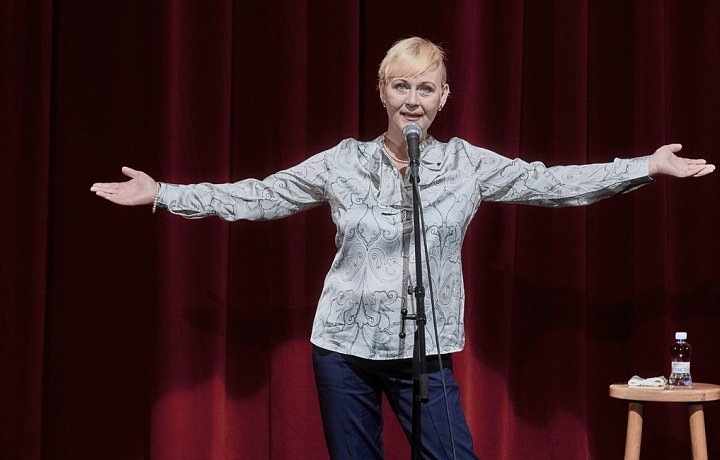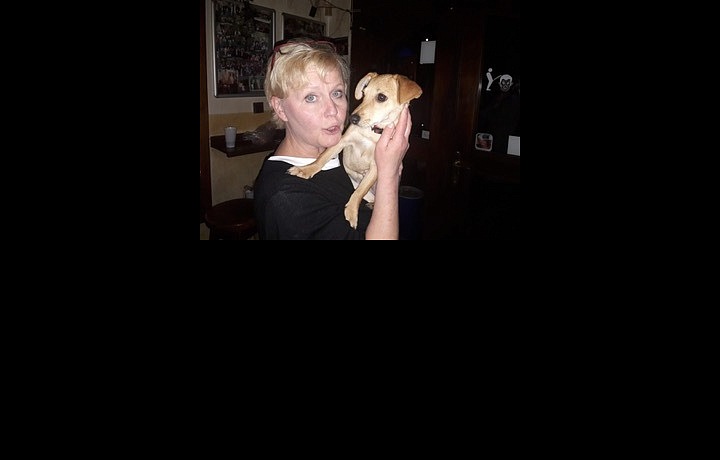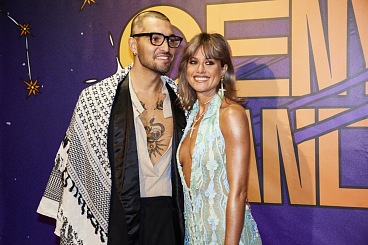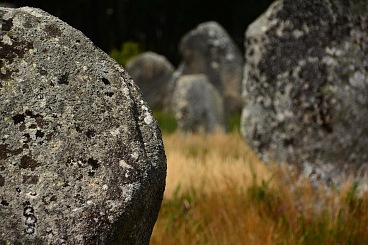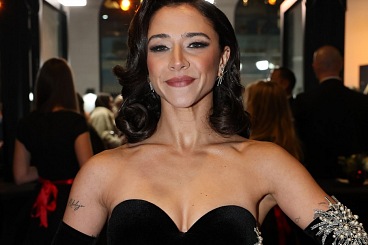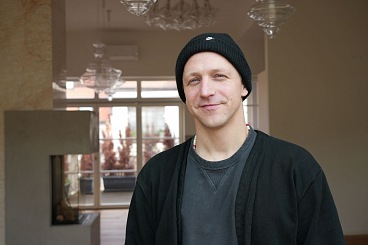Fast Confession - Voice actress Lucie Juřičková: Carrie was getting on my nerves a bit
The actress Lucie Juřičková is literally a woman of many faces. And not just any faces. She's lent her voice to many Hollywood stars and is one of our best voice actors. When I met her and we started talking, it only took a while for me to feel like I was chatting with Carrie Bradshaw from Sex and the City, Valerie from Beverly Hills or Bree Van de Kamp from Desperate Housewives. We talked not only about how she remembers her beginnings in voice acting, but also what she disliked about these cult hit series, or how people respond to her voice in daily life. She also opened up about her time in the National Theater.
People mostly know your voice from series that became cult classics. How do you remember your beginnings in voice acting?
Back during the communist regime I sometimes did loop groups, but that wasn't much of an experience. During my time at the Vinohrady Theater a colleague that already had experience with voice acting got sick. Somebody mentioned me and I was supposed to dub a huge role. I remember that I was absolutely beside myself. I was telling the director Marie Fronková, "Please be patient with me, I'm just starting out, I don't know what I'm doing." (laugh) And then it sort of worked out by itself. You have to have certain dispositions to do it, manage to combine what you hear, see and say. After that I just got into it and dubbed one thing after another.
Do you remember what the first thing that you dubbed was?
No, I unfortunately can't remember that, but I remember that my partner at the time was Jan Šťastný. Which was great, because he was a colleague from theater, so I didn't feel lonely. I think that was in 1993.
Would you be able to tell me how voice acting changed over time?
I would prefer not to make detailed comparisons, I don't want to. The only thing I can say is that the work's gotten faster. You get the script at the studio, you underline your lines, and then you just go until you mess up.
Back then when an actor was dubbing it was common for them to act physically too and put not just their voice into it, but also their physical expression...
Yes, you're right. Back then you'd have the script divided into these so-called loops, which is approximately half a page, and you'd rehearse that beforehand. And only after that would you record for real. Some directors still like rehearsing to this day. I personally often pause during dubbing too, because I feel that I could say something better, stress something for the sake of comprehensibility and context. Besides when a movie is great, you don't want to ruin if for your fellow actors and writers.
If you are able to choose, do you prefer to watch movies subbed or dubbed?
These days I prefer subtitles. Only in extreme cases, when I'm very tired and don't want to read, because my glasses are very strong, I'm willing to accept dub. But before my husband and I watch it, we find out who dubbed it, and decide based on that.
Do you think that any trained actor can also do voice acting?
You have to have a range of skills. As I said at the start of the interview, you have to listen to the original in your headphones, read the Czech script and talk at the same time. A person suffering from let's say dyslexia would probably go insane. These days when there are almost no rehearsals, for sure. It's rather tiring, dubbing for four to six hours straight. So no, I don't think voice acting's for everyone.
Is there anything that can still surprise you at the studio?
Well, sometimes I'm surprised by the adaptation of the script that I get. If the script hasn't been adapted well, and then you find out at the studio that for example the number of pronounced syllables doesn't match, the pauses are badly adapted, or there's an extra sentence. And so on. It's a problem.
I understand that it isn't the easiest to find Czech synonyms. But when you have to be fixing the script at the studio and coming up with phrases, it really impedes the work. It's worst with documentaries, where you have to consult everything, usually scientific terms, with a specialist. Or with Google. So yes, this can still surprise me to this day. Often pisses me off too, actually.
How do you choose offers and do you ever refuse any?
I don't like doing animated movies. Sometimes I have trouble with my vocal cords and animated films put me out of commission pretty quickly, so I try to avoid them.
How do you remember dubbing the series Sex and the City? Did people recognize you from your voice alone?
Not after the very first season, but later on they did. It amazes me to this day, the ratings on that thing. When there are so many great series around. It proves that the script is amazingly written and amazingly acted. And that's the key. I'm happy that I could dub it.
Can you recall a funny story or people's reactions when they recognize your voice?
Sometimes it happens to me, when I'm advising somebody at the supermarket on how to weigh fruits or vegetables for example, that the person suddenly takes notice and then asks me if I do not by chance voice Carrie from Sex and the City. And that's nice. Lately it barely ever happens though, because my voice is deeper. We started dubbing the first episodes 20 years ago, after all!
Have you ever been met with surprise from people about not sharing the same philosophy and passion for fashion as Carrie did?
Thank God, nobody's ever said anything. (laugh)
Did you later watch the series at home? What's your opinion on it?
I was mostly surprised by how open the series was to certain topics. Before then sex just hadn't been discussed this openly in media, or only very rarely. Sex and the City was aimed at a wider audience, and I liked that very much. I really appreciated the dialogues that were often very raunchy. But sex is a normal part of life after all and that whole series is a script-writing masterpiece.
Was there anything that you disliked about the protagonist Carrie Bradshaw?
Well, I have to say that in the last season Carrie started to get on my nerves a bit. I felt like she was being unnecessarily infantile, that she still wanted to appear as some kind of young girl. And I was telling myself, "Damn, girl, you should start acting your age". But that was probably the only thing.
What I really didn't like were the following feature length movies. Those disappointed me incredibly. They could not compare to the series at all - neither the topics nor the dialogues. It took great self-restraint from me to dub them.
What about dubbing Desperate Housewives or Beverly Hills 90210?
Desperate Housewives were a completely different genre, but I liked it a lot. The only thing that bothered me was that the detective plots kept going over my head (laugh) When you're voice acting you only see your lines, and I then went around begging colleagues and acquaintances to tell me what was actually going on. The series was on TV at times when I was at the theater, for example. When I sometimes managed to catch an episode airing, I really enjoyed it!
And Beverly Hills I like remembering as well. I remember that we always did the dubbing on weekends and I'd spend 12 hours at the studio on both Saturday and Sunday. It was actually my first series.
Do you ever fail to recognize your voice when you keep the TV going as background noise while doing something?
Yes, it's happened several times. The boys, when they were younger, would sometimes cal to me: "Mommy, that's you talking!" And I'd be like, no way, that's not me, that I'd remember that. Only after giving it a bit of attention did I realize that it indeed was me. (laugh) It's completely natural not to remember everything you've ever voiced. We don't have heads the size of water towers after all.
How much time do you spend at the studio? Is it still a lot?
A few years ago my colleagues and I tried to push for some changes regarding compensation and the methods of dubbing work. A strike of sorts. We didn't achieve anything, because Czech acting business isn't unified. Those of us who signed a contract with the agency that tried to push for our demands found ourselves in a little bit of a voice acting dissent. And studio owners stopped working with us. A blacklist of sorts. So in the last three years both my "naughty" colleagues and I have dubbed essentially nothing. About a year and a half ago I left the agency, and since then I've had enough work. But I'm bummed out that because of a few individuals we did not succeed.
You're also known for your role of Sáša from the movie series Poets...
Even if I cut myself into pieces on stage and delivered the best possible performance, nothing can top Sáša! I'd say that that's my flagship acting performance, because everyone knows Sáša. Director Dušan Klein remembers it to this day and and says, "There's my book maiden Sáša!" The filming was really great, Dušan Klein is a great practitioner and professional. To this day.
You were a member of Vinohrady Theater for a long time. Now you've been performing for five seasons in the National Theater. How do you like it there?
It's really great, I'm very happy there. Of course it was hard to part ways after such a long engagement, I'd spent 23 years at Vinohrady Theater. And I lived out a good chunk of my life there, there was a great team and a lot of fun. But now it's behind me and I'm glad to be where I am.
National Theater has great and elaborate dramaturgy, the directors that work there try to emulate contemporary European theater which uses rather unique means of communication. And I enjoy this immensely. I'm open to new things, I don't want to wind up as some kinda old, butter conservative that's bothered by having to stand on her head on stage. (laugh) I think it comes with the craft.
In Vinohrady theater and before then in Plzeň you used to work with your husband. How was it?
In Vinohrady we could manage not to be in any plays together for the longest time (laugh). Which was practical, because we could take turns looking after the kids. After that, the last six or so years, we met on stage more and more often. But you don't operate as husband and wife on stage. You're just colleagues. We didn't take our work home, we only spent late nights talking after premieres.
How are you spending your summer?
We're planning a week long vacarion in Croatia, an acquaintance of ours has a house there. After that my husband and I want to slowly move to our cottage, which we are really looking forward to. We'll collect mushrooms and blueberries and garden, and go on trips. We always make snacks for those as if we were at some kind of summer camp. And we always enjoy it immensely.
Fast confession:
Which Hollywood actress would you like to go out for coffee with?
What did you want to be when you were a child?
What did you hate the most about Carrie from Sex and the City?
Which character from the series that you dubbed did you feel closest to?
Which country would you like to travel to one day?
What can piss you off about people?
How do you like to relax?
What do you enjoy most about life?
Which foreign actress would you like to dub?
What was the most unique gift you've ever received?
Your voice is often labeled as sexy. Do you agree?
What can make you laugh?
Which chore do you hate?
If you weren't an actress, what'd you be?
What would you like to ask me?
Yes, very.
Good luck, then.


